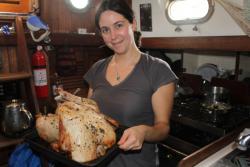 After a few days cruising inside on the Intracoastal Waterway, we were excited to finally be heading outside again to the open Atlantic Ocean. The weather forecasts told us that we'd have to wait a few days in Beaufort, North Carolina for favorable conditions, including Thanksgiving Day, so we hiked to the local health food store in search of a well-raised turkey. Amazingly enough, an hour or so before closing time the night before Thanksgiving we found one previously happy turkey on the freezer shelf, and though it was spoken for, the store owner called the person who ordered it confirming they actually had ordered it for Christmas. She kindly sold it to us, ordering them another from a local farm. We carried our 15 pound bird and various other supplies Jamie needed to prepare a decadent feast for two back to the boat.
After a few days cruising inside on the Intracoastal Waterway, we were excited to finally be heading outside again to the open Atlantic Ocean. The weather forecasts told us that we'd have to wait a few days in Beaufort, North Carolina for favorable conditions, including Thanksgiving Day, so we hiked to the local health food store in search of a well-raised turkey. Amazingly enough, an hour or so before closing time the night before Thanksgiving we found one previously happy turkey on the freezer shelf, and though it was spoken for, the store owner called the person who ordered it confirming they actually had ordered it for Christmas. She kindly sold it to us, ordering them another from a local farm. We carried our 15 pound bird and various other supplies Jamie needed to prepare a decadent feast for two back to the boat.
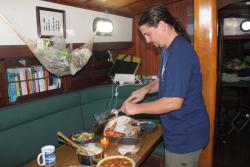 Thanksgiving Day my wife was up to start cooking by 8am, while I stared at my computer screen and caught up with work. My stomach was rumbling by noon as the boat had filled with amazingly distracting smells hinting at what was to come. We ate early, by 3pm, as I'd promised to take Jamie to see Harry Potter after the meal. When we finally sat down to eat, the food proved to be truly wonderful, and it stocked our ice box with ample (excessive even) leftovers for our upcoming trip outside, most significantly with endless bags of turkey.
Thanksgiving Day my wife was up to start cooking by 8am, while I stared at my computer screen and caught up with work. My stomach was rumbling by noon as the boat had filled with amazingly distracting smells hinting at what was to come. We ate early, by 3pm, as I'd promised to take Jamie to see Harry Potter after the meal. When we finally sat down to eat, the food proved to be truly wonderful, and it stocked our ice box with ample (excessive even) leftovers for our upcoming trip outside, most significantly with endless bags of turkey.
Saturday arrived, the day the forecasts had predicted would treat us to North winds and following seas. We awoke at 6am and discovered that the forecast had changed and a small craft advisory was still in effect suggesting that it was still rough and windy outside. We took our time getting ready, taking one more shower at the marina (a most coveted activity when underway from anchorage to anchorage) and I prepared a Turkey quiche for breakfast beginning our ongoing effort to use up our copious turkey leftovers.
By 10am we decided in spite of the chilly 25 knot winds it was time to get underway. The wind was supposed to calm down after noon, and it was already blowing out of a northerly direction which we figured should help us on our journey south. When we'd arrived at the marina a couple of days earlier it had been low tide, and we'd bumped bottom while entering our slip. The dock was unique, being a floating dock only on a small finger by our bow, while our midships and stern were hanging out into the water and tied to a couple of pilings. Between the 25 knot winds blowing firmly against our starboard side, and the shallow spot not far off our stern (though we timed our departure to be during a higher tide), I was somewhat nervous about getting out.
Jamie sometimes points out that I'm always the one to dock the boat, never giving her a chance to learn that skill. I've tried explaining that until I'm more talented at it it's difficult to teach, that I'm apt to give her bad advice. However, this time it seemed very likely that we were going to have an exciting departure during which someone was going to have to run from side to side and forward and aft with a bumper to fend us off the dock and other boats, so I suggested that Jamie could take the helm leaving me to get my exercise running around. She bravely accepted the challenge, and agreed to do exactly what I told her.
I untied the non-working lines, then untied the working lines and the boat instantly started drifting back away from the dock toward the shallows. From the bow I told Jamie to start backing out slowly, but to be cautious of the oyster bed we'd hit coming in only a few days earlier. I stood on the port side of our bow in case the wind blew us into the dock or another boat. When we were about half a boat length from the slip, I told her to turn hard over and bump it forward. This is when things started not going as planned.
In spite of all our practice anchoring, and the knowledge that the 37 feet between the bow and stern makes it impossible to properly hear one another I made the assumption that this time she could hear me over the 25 knot winds and engine. Indeed, she had powered the boat forward and put it hard over correctly, but when I'd said "bump" I meant to only briefly power it forward. We were quickly returning into our slip with a sharp angle right at the piling our stern had been tied to. In my sudden panic as a control freak unable to personally control a situation, I forgot our Nigel Calder-taught hand signals and did a calisthenic dance on the bow as I shouted at her to put it into neutral and then to back up as our bow quickly approached the telephone pole sized piling sticking out of the water. She calmly waited for me to do something useful, living up to her bargain to do exactly as I told her.
I abandoned my morning exercises and quickly clambered to the tip of the bowsprint and deflected the bow from a direct hit, while in the stern Jamie decided to take matters into her own hands and reversed the boat away from the pilings. Still forgetting the laws of sound and distance I again shouted instructions, "forward, hard over" and once again we charged toward the dock as she obliged. The winds and my arms helped us clear the piling on the second try, and we slithered along the sterns of boats and pilings to freedom without damaging ourselves, our boat, or other boats.
After my adrenaline rush subsided we talked through our little adventure, and I came to terms with the fact that I'd been the one at fault through all of this. I agreed to resume using hand signals going forward so that there was no doubt about what was to be done, and Jamie noted that had she used her own judgment instead of trying to understand what I was shouting things would have gone smoother. All being well that ends well, nothing was damaged during our bumps and we were happily underway. We hailed the bridge to get out of Beaufort, and charged underneath when it swung open for us.
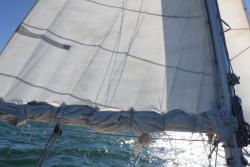 In spite of the 25 knot winds, there were fisherman all over the channel leading out to the ocean. We raised our staysail and our double-reefed mainsail before getting outside and as soon as we were confident that we'd be able to keep wind in the sails for the rest of the trip. We had reefed our main for the first time alone the night before, figuring out how to run the lines and fastening everything tightly in preparation for the gusty winds.
In spite of the 25 knot winds, there were fisherman all over the channel leading out to the ocean. We raised our staysail and our double-reefed mainsail before getting outside and as soon as we were confident that we'd be able to keep wind in the sails for the rest of the trip. We had reefed our main for the first time alone the night before, figuring out how to run the lines and fastening everything tightly in preparation for the gusty winds.
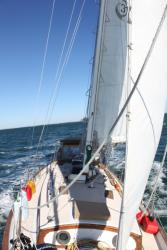 Well after noon it was clear that the forecast was no longer accurate, as the strong winds continued to gust much later than predicted and the seas continued to build. Until shortly before dark we continued beating into the wind and waves, the US coastline in the area outside Beaufort being more east west than north south. As night fell, however, the winds clocked around behind us and subsided somewhat, making for a somewhat smoother ride.
Well after noon it was clear that the forecast was no longer accurate, as the strong winds continued to gust much later than predicted and the seas continued to build. Until shortly before dark we continued beating into the wind and waves, the US coastline in the area outside Beaufort being more east west than north south. As night fell, however, the winds clocked around behind us and subsided somewhat, making for a somewhat smoother ride.
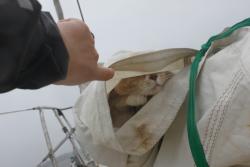 For me, there's always a twinge of trepidation as the sun begins to set and we're well away from land combined with conditions that are not optimal. The boat was bouncing enough that there was no joy in going below to get out of the chilly wind, and it was clear that the 50 plus hour trip we had planned was not going to rank highly among our most enjoyable sails. I pushed the concerns out of my consciousness, focusing on the fact that we'd just left a very impressive boatyard with knowledgeable and caring experts crawling over every inch of our boat. I thought back to my recent trip to Grenada with Bill and other friends, and the 30 knot winds we'd sailed in every day there. Sadly that also reminded me of the warmth that had been in the Southern Caribbean, something we lacked in late November off the North Caroline coastline as the temperature continued to dwindle along with the fading twilight.
For me, there's always a twinge of trepidation as the sun begins to set and we're well away from land combined with conditions that are not optimal. The boat was bouncing enough that there was no joy in going below to get out of the chilly wind, and it was clear that the 50 plus hour trip we had planned was not going to rank highly among our most enjoyable sails. I pushed the concerns out of my consciousness, focusing on the fact that we'd just left a very impressive boatyard with knowledgeable and caring experts crawling over every inch of our boat. I thought back to my recent trip to Grenada with Bill and other friends, and the 30 knot winds we'd sailed in every day there. Sadly that also reminded me of the warmth that had been in the Southern Caribbean, something we lacked in late November off the North Caroline coastline as the temperature continued to dwindle along with the fading twilight.
Only a few days from December, the days were much shorter than when we'd sailed up the coastline in the summer time a year and a half earlier. By 6pm it was dark, and by 8pm we were exhausted and chilled through to the bone, all too aware that it would not get light and warm up again until around 6:30 the following morning, over 10 hours away.
After a warm dinner of tasty Thanksgiving leftovers, I climbed below to take an hour long nap on the settee. I buried my entire body in quilts and despite the cold and bumpy ride tossing my body back and forth I quickly sunk into a deep sleep, an ability that Jamie tells me she envies. What felt like seconds later my phone alarm was sounding and I returned to the cockpit to relieve a drained and chilled Jamie. She tried to emulate my nap, but found the rocking too extreme to fall asleep, returning exhaustedly to the cockpit an hour and a half later.
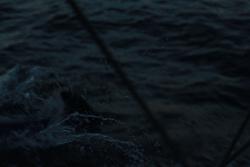 By now the stars were out brilliantly overhead. When we gazed upward we'd momentarily forget about our discomfort, lost in the unbelievably bright night sky one finds when out at sea and away from city light pollution. We picked out familiar constellations and marveled to one another at what we were seeing. As if it wasn't magical enough, while we waxed poetic about the stars dolphins began playing around our boat, keeping us company and guiding us through the chilly darkness.
By now the stars were out brilliantly overhead. When we gazed upward we'd momentarily forget about our discomfort, lost in the unbelievably bright night sky one finds when out at sea and away from city light pollution. We picked out familiar constellations and marveled to one another at what we were seeing. As if it wasn't magical enough, while we waxed poetic about the stars dolphins began playing around our boat, keeping us company and guiding us through the chilly darkness.
Jamie returned to the helm and I stretched my legs out across the cockpit, once again feeling exhausted and chilled. The music seemed blaringly loud from a speaker directly over my head, but again I instantly sunk into a deep hour long sleep until the album ended waking me with cold silence. Jamie assured me she was still doing well and that she'd be unable to sleep, so I leaned back once again and slept through a second album. I was awakened to Jamie's voice telling me that her arm had finally grown too sore from steering the boat against the ever growing, following seas and that she was ready for a break.
The night continued like this, with each of us taking cat naps in the cold when we could. At some point I remembered that we had chemical hand warmers in our self-created medical kit, so we shook them into action and each placed one next to the core of our bodies as the temperature had literally dropped to within a few degrees of freezing, the warm packets drastically improving our spirits again.
During the day we steer by the compass when out on the open ocean, as land is not in sight and there's nothing visual to steer by. Unfortunately our compass light is burnt out, however, so in the dark we are unable to use the compass. Instead, we find our heading with the GPS and then we locate a star or planet to steer by. For long, cold hours, we scan the horizon for the lights of other boats, glance at the GPS, but primarily watch a star to ensure that we're headed in the correct direction.
Around midnight Jamie returned to the cockpit as I nervously guided the boat across the Frying Pan Shoals off of Cape Fear. Earlier in the day the harbor master in Beaufort had cautioned me to be careful in this area so I was eager to put it behind us. We strained our eyes against the darkness on the lookout for markers, when suddenly Jamie pointed out a red light behind us. I looked back to see what she'd spotted and was shocked to have missed a marker of that size. 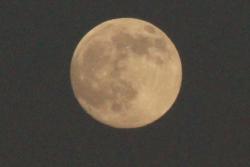 The longer I looked at it, the more concerned we became as in our exhaustion we struggled to match what we were seeing with something that made sense. The marker seemed bigger than ever, a large orange square breaking through the clouds where the ocean and sky met. It was a long half minute before we burst into laughter realizing that what we were seeing was in fact the waning moon rising out of the ocean. (The moon picture included here is actually from a couple weeks earlier when the moon was full)
The longer I looked at it, the more concerned we became as in our exhaustion we struggled to match what we were seeing with something that made sense. The marker seemed bigger than ever, a large orange square breaking through the clouds where the ocean and sky met. It was a long half minute before we burst into laughter realizing that what we were seeing was in fact the waning moon rising out of the ocean. (The moon picture included here is actually from a couple weeks earlier when the moon was full)
In reasonable conditions we take three hour shifts, time enough to get some good sleep but not too long for the person piloting the boat alone through the darkness to become too miserable. In crappy weather we shorten our shifts to two hours, as the cockpit becomes much less enjoyable. In this near-freezing northern wind we were taking closer to one and a half hour shifts, long enough for our arms to grow sore from fighting the waves and our bodies to grow numb from cold. As dawn approached, I'd managed to get about four hours of sleep while Jamie was becoming groggy with next to no sleep at all. I sent her down below for an extended nap and braced myself for a longer shift.
The minutes move slowly at dawn when you're counting the seconds until you can perceive the world beginning to slowly grow lighter. I squeezed my arm over the hand warmer that was radiating heat into my armpit and scanned the horizon for lights from other boats that we'd seen following us the previous day, all the while hoping for sunrise. Dolphins had followed us through the night, a pleasant distraction each time they'd surface for a few moments matching our speed and playing in our wake. In my exhaustion I'd check and recheck the chart plotter wondering if they were warning me about my course, but we were doing well.
Finally I realized I was able to visually perceive the seas that had risen over night, that dawn was beginning to break. My excitement was somewhat mellowed by the size of the waves I was beginning to see, nothing we'd not sailed through before but larger than is comfortable. Fortunately we had following seas, but unfortunately they were directly off our stern which was what was making the steering so challenging. The three to five foot waves would lift our stern as they overtook us from behind, and sometimes would push us one way or the other requiring me to quickly correct and straighten the boat again to prevent an unsettling side-to-side rocking.
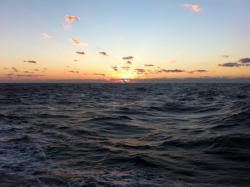 An hour later and the sun actually begin to rise out of the ocean. In the cold I glanced over my shoulders but couldn't bring myself to get overly excited. Finally I repositioned myself on the opposite side of the cockpit so I could watch the spectacular colors spreading across the horizon and fought back the desire to wake my hopefully sleeping wife so she could share it with me. Clouds on the horizon were painted in vibrant oranges and reds, and I considered quickly dropping below to dig out my camera in spite of the knowledge that this would inevitably cause us to veer off course uncomfortably. I finally remembered I had my phone with me, and snapped off a quick photo. Moments later while admiring the view with my own eyes, I was awed to see a massive sailfish leap entirely out of the water and from my perspective literally jump over the sunrise. My teeth stopped chattering and my jaw dropped, and suddenly I remembered the attraction to this lifestyle in full force. It wasn't for many long minutes before I even thought to regret that I'd not snapped my photo at that moment.
An hour later and the sun actually begin to rise out of the ocean. In the cold I glanced over my shoulders but couldn't bring myself to get overly excited. Finally I repositioned myself on the opposite side of the cockpit so I could watch the spectacular colors spreading across the horizon and fought back the desire to wake my hopefully sleeping wife so she could share it with me. Clouds on the horizon were painted in vibrant oranges and reds, and I considered quickly dropping below to dig out my camera in spite of the knowledge that this would inevitably cause us to veer off course uncomfortably. I finally remembered I had my phone with me, and snapped off a quick photo. Moments later while admiring the view with my own eyes, I was awed to see a massive sailfish leap entirely out of the water and from my perspective literally jump over the sunrise. My teeth stopped chattering and my jaw dropped, and suddenly I remembered the attraction to this lifestyle in full force. It wasn't for many long minutes before I even thought to regret that I'd not snapped my photo at that moment.
I watched the compass in our cockpit, keeping the boat pointing exactly at 240 degrees as best as I was able. A little below that and the sails would start to flog as the wind passed to the other side of our stern. A little above that and our course would take us into shallower water highlighted with red numbers by our chart plotter, indicating insufficient depth to float our boat.
Jamie awoke and started heating water for coffee. The waves had grown to the four to six foot range, but I was now watching dolphins jump fully out of the water off either side of our bow, launching themselves playfully out of the sides of the sizable waves perhaps under the assumption that we too were having the time of our life.
We reviewed our charts and discussed our options, both agreeing that a second night outside in this cold would be just plain stupid. The sea state was certainly not enjoyable, but it was totally trumped by the temperature. With our plans to fly to Alaska in a couple of weeks we'd already mailed off our warmest clothes thinking at the time we were being smartly efficient. We looked at the chart and determined that we could make it to Charleston, South Carolina by dark if we continued at our present speed. So we set our new course and felt our spirits lift to know that we'd be tying up to a dock that night, possibly even taking a hot shower.
Hot coffee and the last of our turkey quiche gave us renewed energy. We spotted another sailboat further inland and watched as it headed out are way, slowly disappearing off our stern moving along slower than we were but roughly on the same course. By early afternoon we could see on the GPS chart plotter that we were approaching the Charleston entry buoys. Jamie refilled my coffee cup and with caffeinated resolve I vowed to get us inside before I ended my shift.
When we finally spotted the buoys with our own eyes eyes, I commented how it seemed that the seas were already subsiding. No sooner had the words left my mouth when a monster wave crashed over our stern and Jamie gave me a silent look indicating she didn't agree. My suggestion that she might want to grab the camera earned another silent look, as a wave lifted our stern out of the water and our 37 foot boat surfed down the wave at an angle sinking the port rail six inches under the water.
By this time, Quixote was completely restless. He'd perch in one uncomfortable spot for a minute or two, then jump across the boat to another uncomfortable spot as if in hopes of finding some place where the world wasn't a rocky tempest. He refused to go downstairs where it's noisy, either afraid of falling objects or innately aware that down below is where one tends to get seasick when it's rough. At some point, he started eying the bow as a potential respite from the storm, and after an especially violent wave he started his mad dash forward. Jamie yelled and leaned forward to stop him, slipping and plopping herself ungracefully and painfully into the sole of the cockpit. I was closer and simply reached out to grab him by the tail, unceremoniously hauling him back into the relative safety of the cockpit. Moments later we slid off another wave and sunk our rail, flooding the area of the boat where he'd have been standing. He seemed to comprehend this as he stopped trying to head to the bow.
As we worked our way through the channel markers, we had to change our course so the waves were more on our side rather than our stern in order to keep ourselves pointed toward Charleston. The average wave was only 3-5 feet tall, but occasionally sets of much larger waves would wash through, forcing us to tack back and forth and slowing our approach to the peaceful waters inside. We still had our staysail and reefed mainsail up, but the 30 knot gusts were proving it was going to be necessary to drop the main before we got inside.
Jamie took the helm, and I carefully made my way forward to the main mast to lower the mainsail. The 6 foot waves were bad enough when we'd been traveling across them, but now we were forced to point right into them to take the wind out of the sails. Jamie was struggling to keep us pointing into the waves, having to increase the power to maintain steerage, powering us harder into the waves. With the biggest waves, I'd wrap my arms around the mast as we shot upward them slammed back down and the splashing waves would spray across my face and body. In the relative calmness that would follow, I'd quickly pull down as much of the sail as I could until it was all down and tied up. Usually I pride myself in making it look nice, but this time it looked like I'd wrapped up a number of dead bodies with it and I was more than content. I eagerly returned to the cockpit, and was happy to find that the boat was handling much better without a mainsail as we crossed the gusting winds and continued to make our way inside.
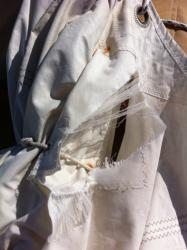 When dropping the main, I noticed that we'd managed to blow out our mainsail sometime during our trip. We later learned that this was due to how we'd tied our reef, our main reef line not tight enough, and the ties that are to make it pretty too tight putting stress in the wrong places. This combined with the wind coming right off our stern and occasionally jibing our sails was enough to tear it. We considered it a rite of passage, the first blown mainsail of our sailing career!
When dropping the main, I noticed that we'd managed to blow out our mainsail sometime during our trip. We later learned that this was due to how we'd tied our reef, our main reef line not tight enough, and the ties that are to make it pretty too tight putting stress in the wrong places. This combined with the wind coming right off our stern and occasionally jibing our sails was enough to tear it. We considered it a rite of passage, the first blown mainsail of our sailing career!
It took well over an hour to work our way through the channel markers into the protection of the breakwater. We were in awe as we watched two other boats working their way outside into what we'd just managed to safely leave behind us. As the darkness of night started falling, we found ourselves back in protected waters, though still healing over thanks to 30 knots of wind gusting into our staysail. Jamie took over at the helm, and I dropped the final sail in preparation for tying up to the Charleston Megadock.
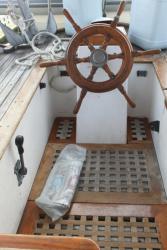 We were tied up to the dock by 6:45pm, and soundly asleep by 9pm. The next morning after over 12 hours of sleep, we talked about our trip and agreed that it was really just the cold that made it so miserable. The waves and wind weren't especially enjoyable, but it was the cold that we didn't want to repeat. We enjoyed our time on the Megadock, a huge and busy stretch of dock cluttered with multi-million dollar megayachts, expensive power and sailboats alike next to less fancy cruising boats like our own.
We were tied up to the dock by 6:45pm, and soundly asleep by 9pm. The next morning after over 12 hours of sleep, we talked about our trip and agreed that it was really just the cold that made it so miserable. The waves and wind weren't especially enjoyable, but it was the cold that we didn't want to repeat. We enjoyed our time on the Megadock, a huge and busy stretch of dock cluttered with multi-million dollar megayachts, expensive power and sailboats alike next to less fancy cruising boats like our own. 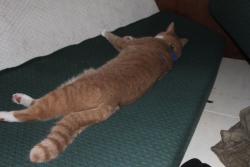 It's the only place we've ever tied up that included a free paper waiting for us in our cockpit when we woke up in the morning! We refueled and found a talented sailmaker near the docks who agreed to patch our sail and get it back to us in the same day. Within twenty four hours we were rested up and ready to continue our travels south.
It's the only place we've ever tied up that included a free paper waiting for us in our cockpit when we woke up in the morning! We refueled and found a talented sailmaker near the docks who agreed to patch our sail and get it back to us in the same day. Within twenty four hours we were rested up and ready to continue our travels south.